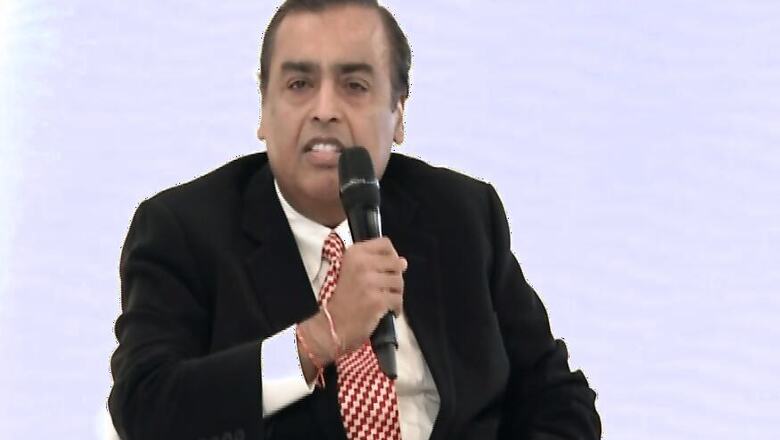
views
New Delhi: It’s rare to see Mukesh Ambani, Chairman of Reliance Industries and the richest Indian, have a candid conversation on business, competition and future. It’s rarer to have him discuss money, success, family and dreams. One got to see him up close and personal at the Hindustan Times Leadership Summit in an interview with R Sukumar, editor-in-chief of Hindustan Times. Edited excerpts:
Q. You spoke about the huge amount of investment that you have made in Jio. There have been questions about your ability to recoup this investment and how much time it would take. Everyone knows how shrewd a businessman you are, so it is highly unlikely that you would be doing things for charity. So, how soon do you expect Jio to turn profitable?
Mukesh Ambani: Jio’s results are declared every quarter now and you can see the trend and watch the next few quarters. You will learn in January and you will learn in March. I do not want to predict, but I think we are ahead of our schedule in terms of the returns that we are generating.
Q: Which should we watch closely, January or March?
Mukesh Ambani: Watch all the three quarters.
Q: How do you decide how to enter a business? What are the parameters a business has to meet before Reliance decides to enter?
Mukesh Ambani: The Reliance DNA started from my father when he founded RIL. At that time, he had ingrained into us that as a business you must solve problems. The economic value is more of a by-product. So if you look at the history of Reliance, we started with clothing, we started with textiles, we went on to developing the textile industry, then we built refinery, which was about energy security. We solved the problem at that time in terms of India not importing diesel and petrol.
If we look at our entry in retail, it was linked to the need for employment creation and as our balance sheet becomes stronger, we still look to solve problems to create societal value. And now I and our people are challenging ourselves to solve the more difficult problems… we can take some risks.
Not many in the world had backed us for what we did with Jio. But we are strong believers that if India and 1.3 billion Indians have to participate in this new world, we cannot always have data infrastructure that is 20 years behind the (developed) world. I think India, in terms of data infrastructure, will be ahead of the US by 2019.
As we move forward, we think about more difficult issues that create value for all Indians. I think agriculture is difficult and that is something that needs to be taken up. Education is important. And healthcare is the most difficult. So, we would clearly think about what we can do in each of these areas.
Q: You spoke about creating value for all Indians. Earlier this week, one of your rivals in the telecom business in a newspaper interview spoke about Jio destroying $50 billion value in the telecom industry.
Mukesh Ambani: Sunil is a good friend of mine. He is not a rival.
Q: But he is a business rival.
Mukesh Ambani: I do not think of businesses in that way. What he said and what you are interpreting is different.
But just to make my point of view clear, I think that for all of us within industry, profits and losses are risks that we take. I do not think we can rely on regulators or governments to guarantee our profits or losses.
To me, what is most important is ‘do we really move the country forward?’ and ‘does the consumer gain?’ Even if there are profits and losses, who gains and who loses? As long as the consumer gains and the country moves forward, it is worth taking those losses. Some of us are big boys, we can afford that.
Q: A lot of people define you in terms of your wealth. What does money mean to you now?
Mukesh Ambani: Frankly, money has never meant much to me. I abhor the labels and the titles which all of you refer to in terms of where we are. But to me, resources enable you to take risks from a company’s point of view, which you would have not done. So it gives you a little bit of flexibility.
On a personal level, very few people know this, but my sister Nina is somewhere in the audience. I have, from childhood, in school, and till now, have never carried money. So I do not have a credit card, I do not carry cash in my pocket. I always have somebody around me who pays for me. So that works.
Q: In the course of your speech, you mentioned agriculture. It is clearly an area where so much needs to be done. Why doesn’t someone like you get into that area in a significant way and make a difference?
Mukesh Ambani: What I said are things that I genuinely believe. This is a time when things are coming together. There are combinatorial technologies… things have to come together and I think that things are coming together. India has a great opportunity and surely this is a difficult problem to tackle. But we are ready to take on difficult problems and it is very much on our roadmap. We are building all the resources, we think through, we just do not jump into anything, we think through it carefully. But agriculture, education and healthcare are on our roadmap, which are the most difficult problems for any economy and they impact the majority of our people.
Q: In education and healthcare, you have these little foundational experiments that you have done. All three are probably areas that can benefit from the kind of scale that you usually bring to businesses.
Mukesh Ambani: Absolutely. Also, what we will be able to do in the next five years in terms of just raw usage of technology. This is the most difficult problem to solve. If we can solve this in India, we can pretty much use that anywhere else in the world. And that is why I say, India has the opportunity to lead the world. We have the opportunity first to solve it in India and then to take it to the rest of the world.
Q: Since its inception, Reliance has had this reputation of being an extremely competitive company. In most businesses, especially Jio for instance, you were not an early entrant. There were incumbents in place and not just ordinary incumbents, but they were huge incumbents. You really seem to be relishing the challenge of this competition and everything else. So is this something you thrive on? Is it something that motivates you? Or do you just look at it from the consumer point of view?
Mukesh Ambani: Our DNA is that we are very focused and we always believe in the principle of saying that if you focus on the goal, you will overcome all obstacles. If you focus on the obstacle, you will never reach your goal. From our point of view, we work very hard and we focus on the goals that we want to achieve.
We at Reliance want to be the best in the world. It was even in the 1970s and 1980s when my father said that why should the Koreans and the Taiwanese lead the polyester industry? Why can’t we do it in India? And today, we are known, we are the biggest in both, not only in size but also in quality.
We had exactly the same conversation with Sunil (Mittal) and Rajan (Mathews) in terms of saying that in the data-driven digital services business, why can’t India be the best? And that is what drives us. So, I am sorry if it appears very competitive from outside, but we just want to be the best in terms of what we do.
Q: Your children are now in the business and you worked very closely with your father when you first got into the business. What was the one thing that you learned from your father which really helped you? And what is the one thing which is really helping you now that you have learned from your children?
Mukesh Ambani: One thing that I could never dare to tell my father was: ‘Dad, you don’t get it’. With this generation, that is the big difference.
Q: Do you get a lot of that?
Mukesh Ambani: I get quite a bit of that. When I showed this speech to Isha, first thing she told me was ‘Dad, very boring’. My father influenced me the most. He treated me like a friend and I hope that I can treat my children as a friend.
Q: Do you get time to read? What are you reading nowadays?
Mukesh Ambani: I make it a point to read quite a bit. I read a lot of technical stuff. I am reading gene editing, CRISPR. Blockchain on the technical side. I read non-fiction. So I read five or six things at a time. In non-fiction, I am reading this great book on Leonardo da Vinci by Walter Isaacson. He is my favourite author. I just finished Dan Brown’s Origin.
Q: So you read fiction also?
Mukesh Ambani: I read fiction, non-fiction and technical, all at the same time.
Q: How would you define success?
Mukesh Ambani: For me, it is fulfilment that is important… which is the lasting satisfaction that you have… that you really tried your best and you have given it everything that you have. Sometimes, in spite of that, you might not achieve your outcome and you have to reconcile with that. That is my philosophy in life.
(Disclosure: News18.com is part of Network18 Media & Investment, which is owned by Reliance Industries)














Comments
0 comment